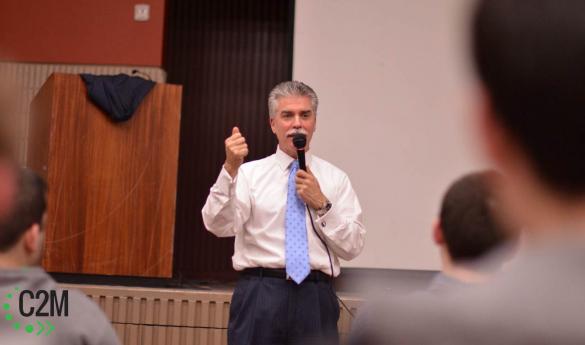Former Secret Service agent gives lesson on leadership
On March 4, 2013, Zeta Tau Alpha and Phi Kappa Sigma hosted a lecture about the importance of leadership. The event featured retired Assistant Director of the Secret Service Nick Trotta who discussed his experiences throughout his tenure in the White House.
Over three decades, Trotta helped to protect five United States presidents. His career encompassed various fields of the Secret Service’s law enforcement, from tracking counterfeiters in Italy to presidential protection. Trotta used personal stories and historical anecdotes to explain his personal approach to leadership.
For Trotta, the mission was always the primary focus. In the Secret Service, the mission demanded constant and undivided attention.
“My job never ended, and that’s not a life for everybody,” Trotta said, explaining how he would talk with every one of his agents about why they wanted to leave the Secret Service. Most agents found travel and instability to be too much stress.
“A leader has to have compassion for the human element,” Trotta said. “You have to sit down with people and really understand them.”
The Secret Service is a job that can often be stressful, where any mistake is subject to public scrutiny. In 2004, Trotta was engaged in a scuffle with Chilean security when they attempted to keep him from following the president into a meeting. The brawl became an international incident when President George Bush returned to rescue his agent from the crowd.
“After the president walked up the stairs, they started closing in and punching me in the side. You can’t see it in the video, but the other agents are behind me fighting their way up the stairs,” Trotta said. Trotta uses the incident to emphasize the importance of teamwork.
“The most important part of leadership is choosing the right team,” Trotta said. “Don’t get hung up on positions and titles. You have to make sure that your people have the necessary tools.”
Meanwhile, the Secret Service presents its own challenges, which Trotta learned one morning in 2003 when he was called into the White House by the Chief of Staff Andrew Card and was told that the president would be visiting Baghdad.
Bush’s surprise visit in 2003 was the first trip of an American president to Iraq and the first time a president would enter an active warzone.
“You have to keep in mind the people you serve. You are obligated to give them advice, to tell them what you think… and in the end, you have to accept their decision,” Trotta said. “That can be the hardest part.”
Trotta cited Pickett’s Charge at the Battle of Gettysburg as an example of accepting the decisions of leadership even when one disagrees. When Confederate General Robert E. Lee ordered General James Longstreet to charge the Union lines, Longstreet voiced his dissent, saying the charge was futile. Lee insisted on the assault, and, when it failed, Longstreet accepted the orders as though they had been his own and refused to shift the blame.
Trotta acquiesced that a leader has to acknowledge his own role in the mission; although he warned “if you put yourself above the mission or the team or those you serve, you will fail”.
Finally, he discussed with the group how these leadership lessons could be applied in any position in any job field. The key, he said, is getting one’s foot in the door.
“The jobs are out there, they’re just competitive. You have to do something that makes you stand out,” Trotta said. “Don’t be so focused on a goal that you lose your options.”

